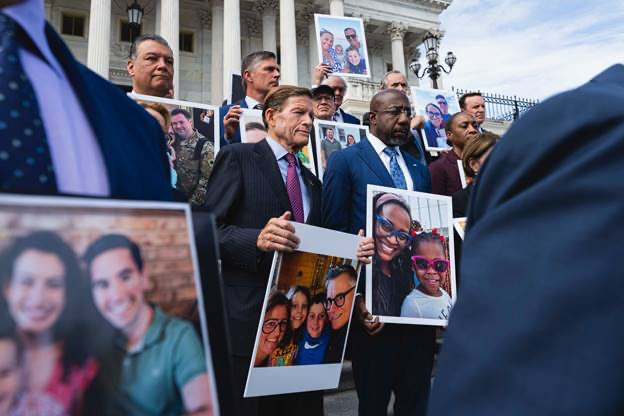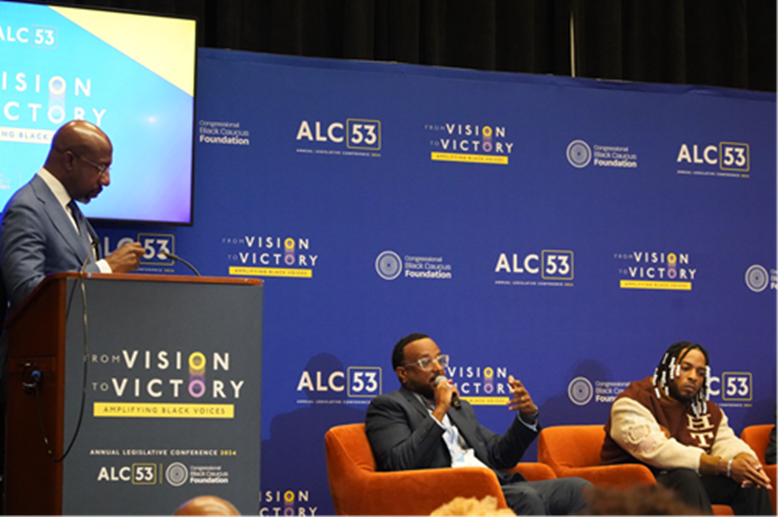
Caption
Sen. Raphael Warnock joined U.S. Senate Democratic colleagues on the steps of the U.S. Capitol to display families and individuals that have benefited from IVF treatment.
Credit: Courtesy of Sen. Raphael Warnock

Sen. Raphael Warnock joined U.S. Senate Democratic colleagues on the steps of the U.S. Capitol to display families and individuals that have benefited from IVF treatment.
Note: In this recurring digital news series, GPB follows your federal tax dollars back to the state of Georgia each week. Neither Sen. Jon Ossoff nor Sen. Raphael Warnock is up for reelection this year — the former will run again in 2026 and the latter in 2028.
For the week ending Sept. 20, the senators focused on urging the U.S. Department of Agriculture to support Georgia farmers after Tropical Storm Debby, building more grocery stores in underserved areas in the state, pushing Republican lawmakers to pass IVF legislation, and addressing how gun violence affects Black youth.
On Sept. 12, Warnock attended the Congressional Black Caucus Foundation’s 53rd Annual Legislative Conference (ALC) in Washington, D.C., and hosted a panel on gun violence.
Warnock gathered gun violence survivors and gun safety advocates for the “Youth Under Fire: Addressing Gun Violence in Our Communities” panel that addressed the consequences of the country’s gun violence problem on youth, specifically Black youth.

From left to right, Sen. Raphael Warnock, Dr. Roger Mitchell Jr., and Armani White attend a September 2024 panel discussing the effects of gun violence on Black youth at the Congressional Black Caucus Foundation’s 53rd Annual Legislative Conference (ALC) in Washington, D.C.
“This public health crisis is undoubtedly stealing generations of youth from the Black community, and the American people are crying out for action on this issue,” Warnock said at the panel. “They want commonsense gun safety reform, but there’s a growing chasm between what the people want and what they can get from their government.”
On Sept. 18, Warnock, as chair of the Senate Banking Financial Institutions and Consumer Protection subcommittee, highlighted the “harmful” practices of the private student loan market at the first “Back to School: Shedding Light on Risks and Harm in the Private Student Lending and Servicing Market” hearing.
According to a press release, the committee analyzed the lack of data and transparency in the private market “while highlighting the potential legislative and regulatory recommendations and measures to stop these abusive practices and to better protect students and taxpayers.”
“I hope today’s hearing helps improve transparency around student lending and brings accountability for the private lenders and student loan servicers that have misled and harmed borrowers,” Warnock said at the hearing. "Indirectly, they harm us all."
On Sept. 18, Ossoff's bipartisan legislation that would crack down on fentanyl trafficking at the southern U.S. border passed the U.S. Senate Homeland Security and Governmental Affairs Committee.
According to a press release, the Detection Equipment and Technology Evaluation to Counter the Threat of (DETECT) Fentanyl and Xylazine Act would "strengthen the U.S. Department of Homeland Security (DHS) 's capacity to detect fentanyl and xylazine at ports of entry and better prevent it from crossing the border."
The legislation comes after the National Immigration Form reported that between FY 2020 and FY 2023, the amount of fentanyl seized at the southern border increased by 480%.
The legislation would require the DHS Science and Technology Directorate to make technology that would help better detect fentanyl trafficking at the southern border.
"Illegal fentanyl trafficking is devastating Georgia families and putting our kids at risk," Ossoff said. "Today, we brought Republicans and Democrats together to advance this bill that will strengthen detection and prevention of fentanyl trafficking."
On Sept. 19, Warnock joined his Democratic colleagues in the Senate on the U.S. Capitol steps to urge Senate Republicans to pass legislation protecting access to in-vitro fertilization (IVF).
Warnock and his colleagues held pictures of people and families from their respective states who have benefited from IVF to display those “at the center of the policy debate happening in Washington,” according to a press release.

Dr. Maya Eady McCarthy and her daughter Charlotte.
Warnock held up the photo of Dr. Maya Eady McCarthy, an Atlanta-based pediatric hospitalist who is the mother of a daughter born using IVF.
On Sept. 19, Ossoff introduced legislation to bring more grocery stores to Georgia communities and support Georgia farmers.
The Fresh Food Act of 2024 would address food insecurity throughout Georgia “by helping attract more grocery stores to Georgia communities with limited access to fresh foods, and to help support Georgia farmers,” per a press release.
The legislation would offer a tax credit to grocery stores opening in underserved areas to make fresh fruit, vegetables, meat and dairy more accessible and to stores sourcing food from local farmers to improve agriculture sales.
“No Georgia family should lack access to fresh, healthy food, but too many communities lack grocery stores,” Ossoff said in a statement. "That’s why I’m introducing the Fresh Food Act, which will support local grocers and farmers."
On Sept. 19, Ossoff and Warnock, along with U.S. Reps. Earl L. “Buddy” Carter (R-GA-01) and Austin Scott (R-GA-08), launched a bipartisan/bicameral inquiry with the U.S. Department of Agriculture (USDA) to ensure that Georgia farmers in South Georgia counties affected by Tropical Storm Debby get proper assistance.
The lawmakers highlighted three Georgia counties that cannot get relief but have farmers reporting severe damage to their land, including flooding and wind damage.
The counties are:
“Tropical Storm Debby hit South Georgia with devastating rain and wind that caused widespread harm to crops and property. Over four days, farms sustained flooding and wind damage that will undoubtedly result in serious financial losses for many Georgia growers,” the group wrote to U.S. Secretary of Agriculture Tom Vilsack.
“We implore you to take every possible step to help these growers recover from this storm by ensuring they receive the maximum support possible under the insurance they have purchased from the Federal Crop Insurance Program.”